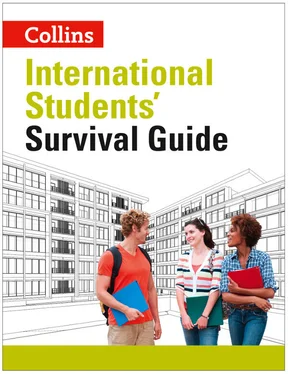You might also want to consider taking the following:
Toothbrush and toothpaste. Don’t forget that you can only take a very small tube of toothpaste in carry-on luggage.
a clean pair of underwear and change of clothes in case your luggage goes missing on your flight
Most airlines are pretty good about returning lost luggage to passengers. Often this takes place within 24–48 hours so you don’t need to take too much with you on the plane.
Don’t pack vast amounts of clothing. Remember that the fashions and climate in your home country are likely to be different from those in your study country.
Make sure you research the climate of the place where you’ll be studying. Don’t trust what you’ve heard about the weather in that country: depending on where your campus is, the weather may be very different from season to season, and even from day to day. Go online to do research. There are lots of good websites where you can find out about local weather.
A good plan is to pack enough clothing for the first couple of months, and then one key item of clothing for the other seasons. For example, if you’re arriving in early fall/autumn, check the weather, pack clothes for that weather, and then add a warm coat, a scarf, a pair of boots, etc. for winter, and assume you’ll need to buy more after you arrive.
Don’t forget the small things like an umbrella. Also, comfortable shoes are useful, especially if you’re heading to a large campus where you may end up doing lots of walking.
Most students (and often staff as well) dress very casually at colleges/universities in English-speaking countries. Most colleges/universities don’t have a dress code, though you will be expected to wear shoes inside buildings. In some places, you may be asked to take off your hat, or remove your hood, when you go inside.
If you’re very different in size or shape from the local people where you’ll be staying, it may be hard for you to find clothes and shoes. You may need to shop online.
You may see students wearing clothing that exposes more of the body than you’re used to during summer. In English-speaking countries it’s acceptable and normal for men and women to bare their arms and calves, and they may bare more than this when it’s hot.
We don’t recommend bringing food, drink, or cooking equipment from home. Trying new foods is part of living in a new country. You may find that your favorite foods are available where you’re studying anyway, especially if you’re in a multicultural city or university town. If you really need foodstuffs from home, organize to buy online or ask someone to mail them to you once you’ve arrived.
Australia and New Zealand have very strict laws about importing foods, and may take them away from you at Customs when you arrive. Don’t take food in your suitcase if you’re going to Australia or New Zealand. In the UK, you’re not allowed to bring in any meat or dairy products if you’re traveling from outside the European Union (EU), and there are limits on other foods too. The US also has strict rules on meat or dairy products from anywhere outside the country.
Pack enough toiletries to last you for the first few weeks: small bottles of shampoo and conditioner, toothbrush and toothpaste, shaving cream, and/or cosmetics if you use them.
Don’t bring big bottles and tubes: buy toiletries at your destination. If you can’t get your favorite products there, see if you can order them online and have them delivered to where you’re staying.
Most airlines will only let you carry very small bottles and tubes of liquids in your carry-on luggage. Check with your airline and put anything too big in your checked luggage.
If you plan to bring electrical devices, check what voltage and what sort of power sockets are used in your destination country. You’ll probably need to buy adaptor plugs. For more details check this website: www.worldstandards.eu/electricity/plugs-and-sockets/.
Consider bringing an electronic translator and a small bilingual dictionary (which translates from English into your language and also from your language into English). These are usually faster, cheaper, and more accurate than using your cell phone/mobile phone to access translations on the Internet.
Don’t fill your suitcase with sheets, towels, blankets, and pillows. Many residences will provide these, and if yours doesn’t, you can buy them cheaply at your destination.
Don’t bring lots of stationery such as notebooks, pens, and so on. Buy these at your destination.
4 Dealing with culture shock
Even though you may be excited about studying abroad, you shouldn’t underestimate the adjustment you’re going to have to make. Think of the biggest change you have had to make in your life so far—now multiply that by ten. Not only will everything around you change, you too will begin to change, and that can be confusing.
We often use the expression “culture shock” to describe the confusion people feel when they are trying to fit into a new culture. However, this expression can be a bit misleading because it suggests that culture shock is like a sudden, upsetting event. In fact, most people experience culture shock as a process—like the process they might go through when they have to adapt to any life-changing event, such as getting married, or having a baby.
Many people have researched and written about culture shock. Although every individual experiences culture shock in his or her own way, researchers have identified certain “stages” that people who live abroad commonly go through. Here, we’ll describe those stages, explain what happens when you “get stuck,” and suggest strategies that you can use to help yourself move on. But remember, this model of culture shock is not a description of what will happen to you—it’s a framework to help you understand your own experience of culture shock.
When you arrive and begin exploring your new environment, you may find the experience very enjoyable at first. Everything may seem fascinating to you: what people eat, the way they move, the sound of their language. Even everyday objects might seem interesting to you because they are so different from what you’re used to: the streetlamps, for example, or the look and feel of a bus ticket. All these new impressions can be very exciting—you may even feel “over the moon” at times. This phase of exploration is therefore often called the “honeymoon” stage of culture shock.
For many people, the excitement of the early days wears off after a while. As you start trying to achieve what you set out to do in your new environment, the “high” is often replaced with a “low” of disappointment. Ways of doing things that seemed interesting at first now seem overly complicated and difficult. Maybe it’s the way officials speak to you that suddenly seems annoying or rude. Or maybe it’s the opening and closing hours of stores that seem so inconvenient. You can’t understand why everything has to be so difficult and why it takes so long to get anything done. You may feel frustrated, angry, or sad. You may start comparing everything in this new place with the way things are at home and find that nothing is as good as it ought to be.
Stage 3: The “adjustment”
Over time, and after several highs and lows, you’ll most likely begin to adjust to your new environment. You’ll learn how things work, and after a while all of those things that seemed so exciting and, later, so annoying, will simply be familiar to you. Everyday tasks such as shopping or getting around on public transportation will become easy. You begin to feel capable again. Your opinions become more balanced: you can see that your new home is neither perfect nor completely awful. You may begin to see the home you left behind in a different way too. Aspects of your culture that you once thought of as “the normal way of doing things” you may now see as simply things that are particular to your culture. Your mind will have opened up to new possibilities, and ideally you’ll realize you have many more choices about how to live your life than you thought you had.
Читать дальше












